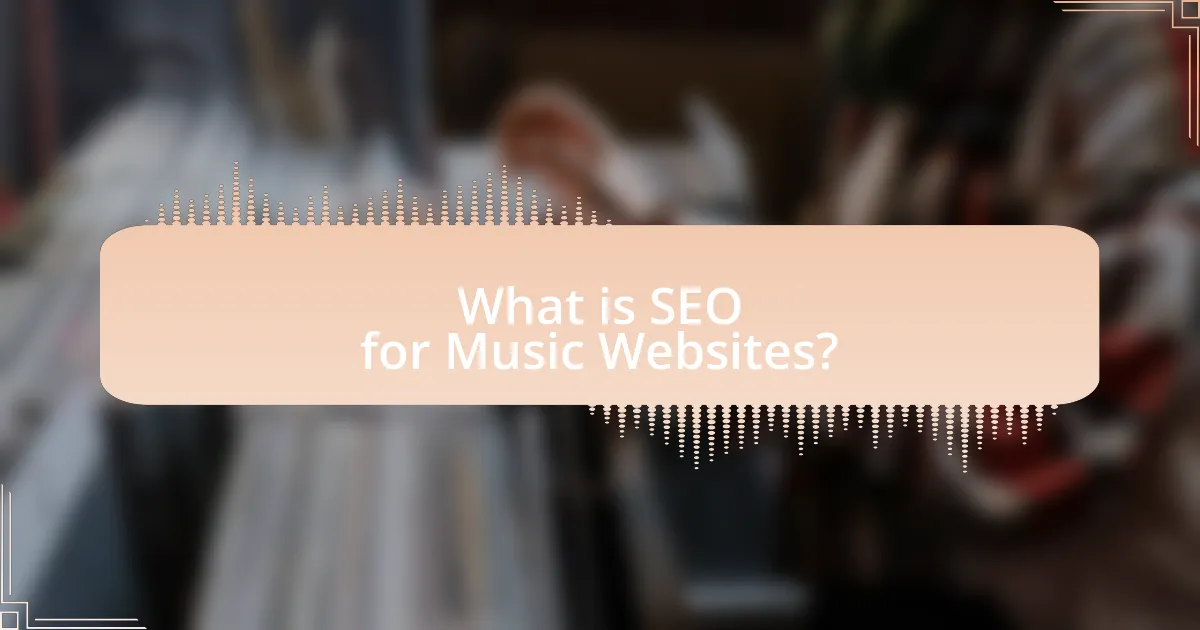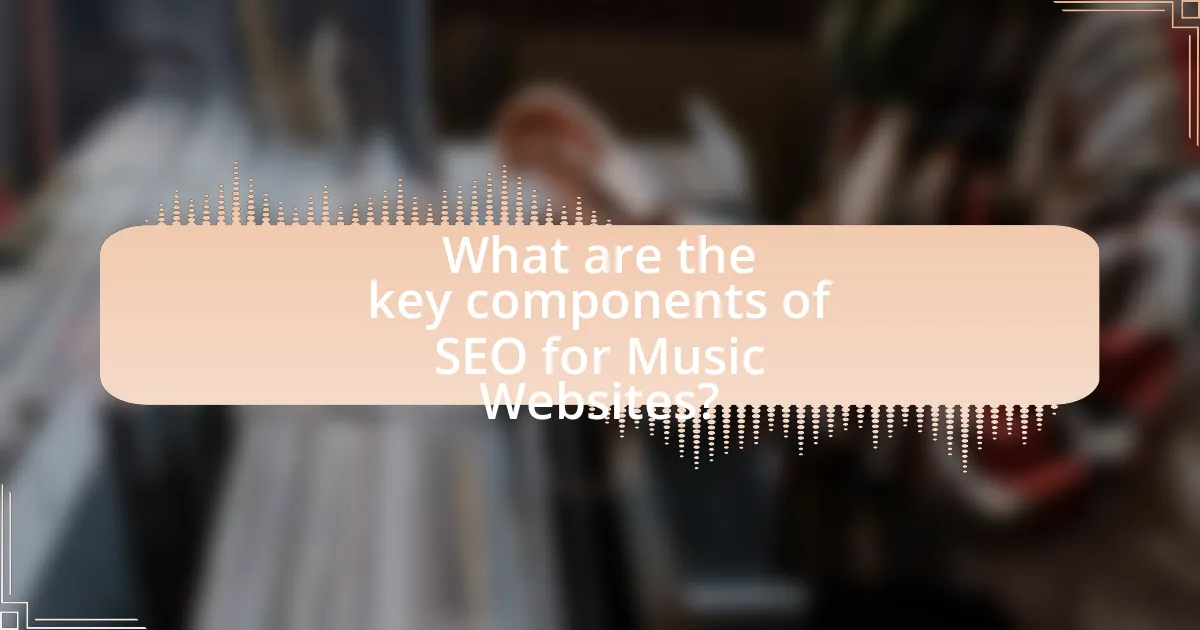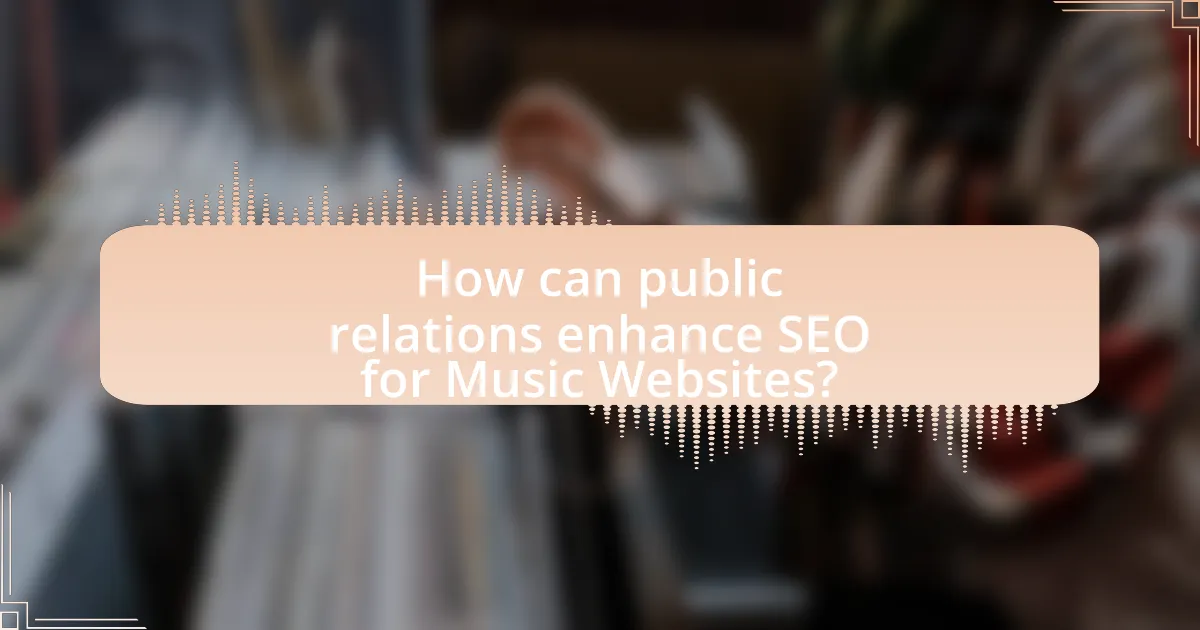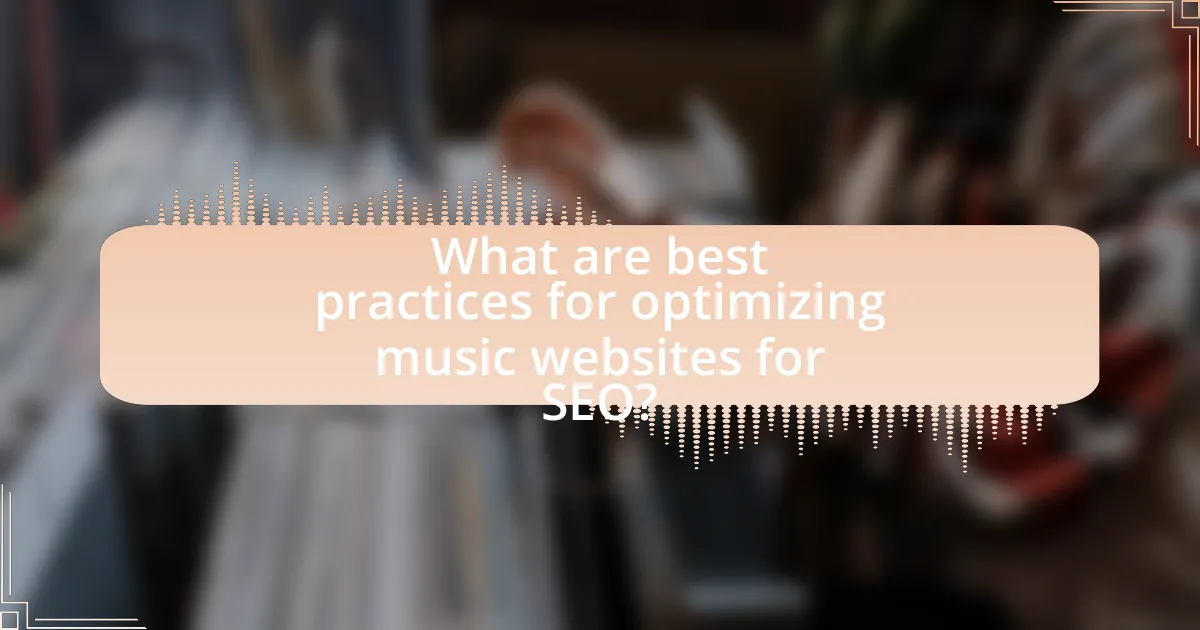SEO for music websites is the process of optimizing music-related sites to enhance their visibility on search engines, thereby increasing organic traffic. The article explores various strategies such as keyword research, metadata optimization, mobile-friendliness, and content quality, which are essential for attracting listeners and promoting artists. It also addresses unique challenges faced by music websites, the influence of music genres on SEO strategies, and the importance of public relations in enhancing SEO through backlinks and brand visibility. Additionally, the article highlights best practices for optimizing music websites, common mistakes to avoid, and metrics to track for measuring SEO success.

What is SEO for Music Websites?
SEO for music websites refers to the process of optimizing a music-related site to improve its visibility on search engines, thereby increasing organic traffic. This involves strategies such as keyword research specific to music genres, optimizing metadata like titles and descriptions, and ensuring mobile-friendliness, as 53% of mobile users abandon sites that take longer than three seconds to load. Additionally, creating high-quality content, such as blog posts about music trends or artist interviews, can enhance user engagement and boost search rankings. Implementing these SEO practices is essential for music websites to attract listeners and grow their audience effectively.
How does SEO specifically apply to music websites?
SEO specifically applies to music websites by enhancing their visibility in search engine results, which is crucial for attracting listeners and promoting artists. Music websites can optimize their content through targeted keywords related to genres, artists, and songs, ensuring that they appear in relevant searches. For instance, using specific phrases like “indie rock playlists” or “latest pop hits” can drive organic traffic. Additionally, incorporating metadata, such as alt tags for images and proper descriptions for audio files, improves indexing by search engines. According to a study by Moz, 71% of search engine users click on the first page of results, highlighting the importance of SEO in reaching potential fans effectively.
What are the unique challenges faced by music websites in SEO?
Music websites face unique challenges in SEO primarily due to the highly competitive nature of the industry and the frequent changes in search engine algorithms. The abundance of content, including music reviews, artist profiles, and streaming services, creates a saturated market where standing out is difficult. Additionally, music websites often struggle with copyright issues, which can limit their ability to use certain media, affecting their content richness and engagement. Furthermore, the reliance on user-generated content can lead to inconsistent quality and relevance, complicating SEO efforts. According to a 2022 report by Moz, over 60% of music-related searches are influenced by local SEO factors, making it essential for music websites to optimize for local search while also addressing broader audience reach.
How do music genres influence SEO strategies?
Music genres influence SEO strategies by dictating keyword selection, content creation, and audience targeting. Different genres attract distinct demographics, which necessitates tailored SEO approaches to optimize visibility. For instance, pop music may require a focus on trending keywords and social media engagement, while niche genres like classical or jazz might benefit from in-depth articles and specialized forums. Research indicates that genre-specific keywords can significantly enhance search rankings; for example, a study by Moz found that using long-tail keywords related to specific music genres can increase organic traffic by up to 50%. Thus, understanding the nuances of music genres allows for more effective SEO strategies that align with audience interests and search behaviors.
Why is SEO important for music websites?
SEO is important for music websites because it enhances visibility and drives organic traffic, which is crucial for artists and labels to reach their audience. By optimizing content with relevant keywords, music websites can rank higher in search engine results, making it easier for fans to discover new music and artists. According to a study by HubSpot, 75% of users never scroll past the first page of search results, highlighting the necessity for effective SEO strategies to ensure that music websites appear prominently. This increased visibility can lead to higher engagement, more streams, and ultimately greater success for musicians and their brands.
What impact does SEO have on music discovery?
SEO significantly enhances music discovery by improving the visibility of artists and their content on search engines. When music websites implement effective SEO strategies, they increase their chances of appearing in search results, making it easier for listeners to find new music. For instance, a study by Moz indicates that 75% of users never scroll past the first page of search results, highlighting the importance of ranking high for relevant keywords. Additionally, optimizing metadata, such as song titles and descriptions, can lead to better indexing by search engines, further facilitating music discovery.
How can SEO enhance audience engagement for musicians?
SEO enhances audience engagement for musicians by improving their visibility in search engine results, which leads to increased traffic to their websites and social media platforms. When musicians optimize their content with relevant keywords, meta tags, and high-quality backlinks, they attract more potential fans who are searching for music-related content. According to a study by HubSpot, 75% of users never scroll past the first page of search results, highlighting the importance of SEO in reaching a wider audience. Additionally, effective SEO strategies can lead to higher engagement rates, as users are more likely to interact with content that appears prominently in search results.

What are the key components of SEO for Music Websites?
The key components of SEO for music websites include keyword optimization, quality content creation, mobile optimization, and effective link building. Keyword optimization involves researching and integrating relevant terms that potential listeners use to find music, ensuring that these keywords are strategically placed in titles, descriptions, and tags. Quality content creation focuses on producing engaging and original material, such as blog posts, music reviews, and artist interviews, which can attract visitors and encourage sharing. Mobile optimization is crucial, as a significant portion of users access music websites via mobile devices; thus, ensuring fast loading times and responsive design enhances user experience. Effective link building involves acquiring backlinks from reputable sites, which can improve search engine rankings and drive traffic. According to a study by Moz, backlinks are one of the top factors influencing search engine rankings, highlighting their importance in SEO strategies.
What role do keywords play in music website SEO?
Keywords are essential for music website SEO as they help search engines understand the content and relevance of the site. By strategically incorporating keywords related to music genres, artists, and trends, websites can improve their visibility in search results. Research indicates that 75% of users never scroll past the first page of search results, highlighting the importance of effective keyword usage to attract organic traffic. Additionally, tools like Google Keyword Planner can assist in identifying high-traffic keywords, further enhancing a music website’s SEO strategy.
How can musicians identify effective keywords for their content?
Musicians can identify effective keywords for their content by utilizing keyword research tools, analyzing competitor strategies, and understanding their target audience’s search behavior. Keyword research tools like Google Keyword Planner and SEMrush provide data on search volume and competition, helping musicians find relevant terms. Additionally, examining the keywords used by successful competitors can reveal trends and opportunities. Understanding the target audience involves considering the language and phrases they use when searching for music-related content, which can be gathered through surveys or social media engagement. This approach ensures that musicians select keywords that not only attract traffic but also resonate with their audience.
What tools can assist in keyword research for music SEO?
Tools that can assist in keyword research for music SEO include Google Keyword Planner, SEMrush, Ahrefs, and Ubersuggest. Google Keyword Planner provides insights into search volume and competition for specific keywords, making it essential for identifying relevant terms in the music industry. SEMrush offers comprehensive keyword analysis, including trends and related keywords, which helps in understanding audience interests. Ahrefs is known for its robust backlink analysis and keyword tracking features, allowing users to discover high-performing keywords in the music niche. Ubersuggest provides keyword suggestions and SEO metrics, making it a user-friendly option for musicians and marketers. These tools collectively enhance the ability to optimize music-related content for search engines effectively.
How does content quality affect SEO for music websites?
Content quality significantly impacts SEO for music websites by influencing search engine rankings and user engagement. High-quality content, such as well-researched articles, engaging videos, and original music reviews, attracts more visitors and encourages longer site visits, which are positive signals to search engines. According to a study by Moz, content quality is one of the top factors affecting search engine rankings, as it directly correlates with user satisfaction and backlinks. Websites that consistently provide valuable and relevant content are more likely to rank higher in search results, leading to increased visibility and traffic.
What types of content are most effective for music SEO?
The most effective types of content for music SEO include high-quality music videos, engaging blog posts, optimized song lyrics, and artist interviews. High-quality music videos attract views and shares, which improve search rankings. Engaging blog posts that discuss music trends or album reviews can drive traffic and enhance user engagement. Optimized song lyrics, when properly tagged with relevant keywords, help search engines index the content effectively. Artist interviews provide unique insights and can generate backlinks from other sites, further boosting SEO performance.
How can musicians create engaging content that ranks well?
Musicians can create engaging content that ranks well by focusing on high-quality, relevant material that incorporates SEO best practices. This includes using targeted keywords related to their music genre, audience interests, and current trends in their content, such as blog posts, videos, and social media updates. Research indicates that content that answers specific questions or provides valuable insights tends to perform better in search rankings, as it aligns with user intent. Additionally, optimizing metadata, including titles and descriptions, enhances visibility in search engines. Engaging visuals and interactive elements, such as polls or Q&A sessions, can further increase user engagement, leading to longer site visits and improved rankings.

How can public relations enhance SEO for Music Websites?
Public relations can enhance SEO for music websites by generating high-quality backlinks and increasing brand visibility. When music websites engage in PR activities, such as press releases, interviews, and media coverage, they attract attention from reputable sources, which often link back to their content. For instance, a study by Moz indicates that backlinks from authoritative sites significantly improve search engine rankings. Additionally, effective PR strategies can lead to increased social media shares and engagement, further driving traffic and improving SEO metrics. This interconnectedness between PR efforts and SEO outcomes demonstrates the value of a cohesive approach to online presence for music websites.
What is the relationship between PR and SEO in the music industry?
PR and SEO in the music industry are interconnected as both aim to enhance visibility and reputation. Public relations (PR) generates media coverage and builds relationships with influencers, which can lead to backlinks and increased online presence. Search engine optimization (SEO) relies on these backlinks and quality content to improve search rankings. For instance, a well-executed PR campaign can result in features in music blogs or news outlets, directly boosting a musician’s website authority and search engine ranking. This synergy between PR and SEO is crucial for artists seeking to expand their reach and engage with audiences effectively.
How can press releases improve SEO for music websites?
Press releases can improve SEO for music websites by generating backlinks and increasing online visibility. When music websites distribute press releases, they often get picked up by news outlets, blogs, and industry-related websites, which creates valuable backlinks. According to a study by Moz, backlinks are a significant ranking factor for search engines, contributing to higher search engine results page (SERP) positions. Additionally, press releases can include targeted keywords relevant to the music industry, enhancing the website’s relevance for specific search queries. This strategic use of keywords, combined with the authority gained from backlinks, can lead to improved organic traffic and better overall SEO performance for music websites.
What strategies can musicians use to leverage PR for better SEO?
Musicians can leverage public relations (PR) strategies to enhance their search engine optimization (SEO) by focusing on building backlinks, creating shareable content, and engaging with media outlets. Backlinks from reputable sites improve domain authority, which is crucial for SEO; for instance, when a music blog features an artist, it often links back to their website, boosting visibility. Creating shareable content, such as press releases, interviews, and engaging social media posts, encourages organic sharing and increases traffic to the musician’s site. Additionally, actively engaging with media outlets can lead to features in articles or interviews, which not only enhances credibility but also generates valuable inbound links. These strategies collectively contribute to improved search rankings and online presence for musicians.
How can social media impact SEO for music websites?
Social media can significantly impact SEO for music websites by driving traffic, enhancing brand visibility, and improving search engine rankings. When music websites actively engage on platforms like Facebook, Instagram, and Twitter, they can attract more visitors, which signals to search engines that the site is relevant and popular. Increased traffic can lead to higher rankings in search results, as search engines prioritize sites with substantial user engagement. Additionally, social media shares and interactions can generate backlinks, further boosting SEO performance. According to a study by Moz, social signals, such as likes and shares, correlate with higher search rankings, demonstrating the importance of social media in enhancing SEO for music websites.
What social media strategies can musicians implement to boost SEO?
Musicians can boost SEO by leveraging social media strategies such as optimizing profiles with relevant keywords, engaging with followers through regular content updates, and utilizing hashtags effectively. Optimizing profiles involves including specific terms related to their music genre, location, and brand in bios and descriptions, which helps search engines associate their profiles with relevant searches. Engaging with followers through consistent posts, live sessions, and interactive content increases user engagement, which can positively influence search rankings. Additionally, using targeted hashtags can enhance visibility and drive traffic to their music websites, as posts with relevant hashtags are more likely to be discovered by new audiences. According to a study by HubSpot, social media posts that include hashtags can increase engagement by up to 12.6%.
How does audience interaction on social media influence SEO rankings?
Audience interaction on social media significantly influences SEO rankings by driving traffic and increasing engagement metrics. When users interact with content through likes, shares, and comments, it signals to search engines that the content is valuable and relevant, which can lead to higher rankings. For instance, a study by Moz indicates that social signals, such as shares and mentions, correlate with higher search engine visibility. Additionally, increased traffic from social media can enhance dwell time and reduce bounce rates, further improving SEO performance.

What are best practices for optimizing music websites for SEO?
Best practices for optimizing music websites for SEO include using relevant keywords, optimizing metadata, creating high-quality content, ensuring mobile-friendliness, and building backlinks. Relevant keywords should be integrated into titles, headings, and throughout the content to improve search visibility. Optimizing metadata, such as title tags and meta descriptions, enhances click-through rates by providing clear information about the page’s content. High-quality content, including engaging blog posts, artist bios, and music reviews, attracts visitors and encourages sharing. Mobile-friendliness is crucial, as over 50% of web traffic comes from mobile devices, and search engines prioritize mobile-optimized sites. Building backlinks from reputable music blogs and industry websites increases authority and improves search rankings. These practices are supported by SEO studies indicating that keyword optimization and quality content significantly impact search engine rankings.
What common mistakes should musicians avoid in SEO?
Musicians should avoid keyword stuffing in SEO, as it can lead to penalties from search engines and diminish user experience. Instead, musicians should focus on using relevant keywords naturally within their content, ensuring that it flows well and provides value to the audience. Additionally, neglecting mobile optimization is a critical mistake; with over 50% of web traffic coming from mobile devices, a mobile-friendly site is essential for retaining visitors. Furthermore, failing to utilize metadata effectively, such as title tags and alt text for images, can hinder search engine visibility. Research indicates that properly optimized metadata can improve click-through rates by up to 30%. Lastly, ignoring analytics and performance tracking prevents musicians from understanding their audience and refining their strategies, which is crucial for long-term success in SEO.
How can musicians ensure their websites are mobile-friendly for SEO?
Musicians can ensure their websites are mobile-friendly for SEO by implementing responsive design, which automatically adjusts the layout based on the device’s screen size. This approach enhances user experience, as Google prioritizes mobile-friendly sites in its search rankings. According to Google’s Mobile-Friendly Test, sites that are not optimized for mobile can experience a significant drop in traffic, as over 50% of web traffic comes from mobile devices. Additionally, musicians should optimize images for faster loading times and ensure that navigation is simple and intuitive on smaller screens. These practices collectively improve both user engagement and search engine visibility.
What technical SEO aspects should music websites focus on?
Music websites should focus on optimizing site speed, mobile-friendliness, structured data, and secure connections. Site speed is crucial as Google considers it a ranking factor; faster sites improve user experience and reduce bounce rates. Mobile-friendliness is essential since over 50% of web traffic comes from mobile devices, and Google prioritizes mobile-first indexing. Implementing structured data, such as schema markup for music-related content, enhances visibility in search results by providing rich snippets. Lastly, secure connections (HTTPS) are vital for user trust and are also a ranking factor for Google, as sites with HTTPS are favored over those without.
What practical tips can musicians follow to improve their SEO?
Musicians can improve their SEO by optimizing their website content with relevant keywords, ensuring mobile-friendliness, and utilizing social media effectively. By incorporating keywords related to their music genre, location, and specific songs into website titles, descriptions, and blog posts, musicians can enhance their visibility in search engine results. Additionally, a mobile-friendly website design is crucial, as over 50% of web traffic comes from mobile devices, according to Statista. Engaging with fans on social media platforms and linking back to their website can also drive traffic and improve search rankings, as social signals are considered by search engines.
How often should musicians update their content for optimal SEO results?
Musicians should update their content at least once a month for optimal SEO results. Regular updates signal to search engines that the website is active, which can improve rankings. According to a study by HubSpot, websites that publish blog posts frequently (at least 16 times a month) receive 3.5 times more traffic than those that post less frequently. This frequency helps maintain engagement with audiences and enhances visibility in search engine results.
What metrics should musicians track to measure SEO success?
Musicians should track organic traffic, keyword rankings, backlinks, and engagement metrics to measure SEO success. Organic traffic indicates the number of visitors coming from search engines, reflecting the effectiveness of SEO strategies. Keyword rankings show how well a musician’s website ranks for targeted search terms, which is crucial for visibility. Backlinks, or the number of external sites linking to a musician’s content, enhance authority and improve search rankings. Engagement metrics, such as bounce rate and average session duration, provide insights into user interaction and content relevance, which are essential for optimizing SEO performance.